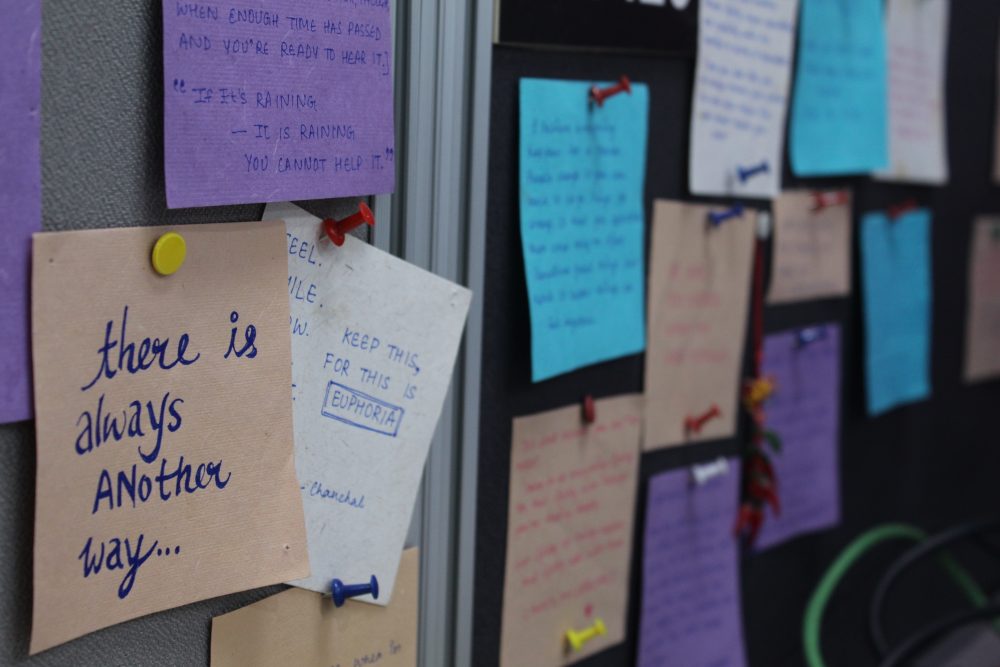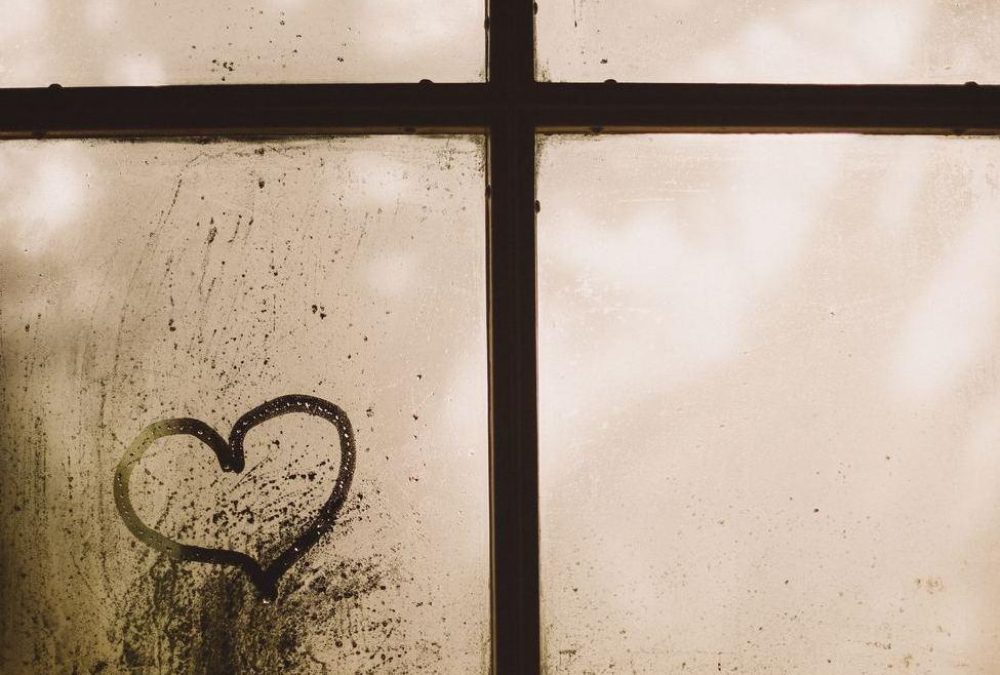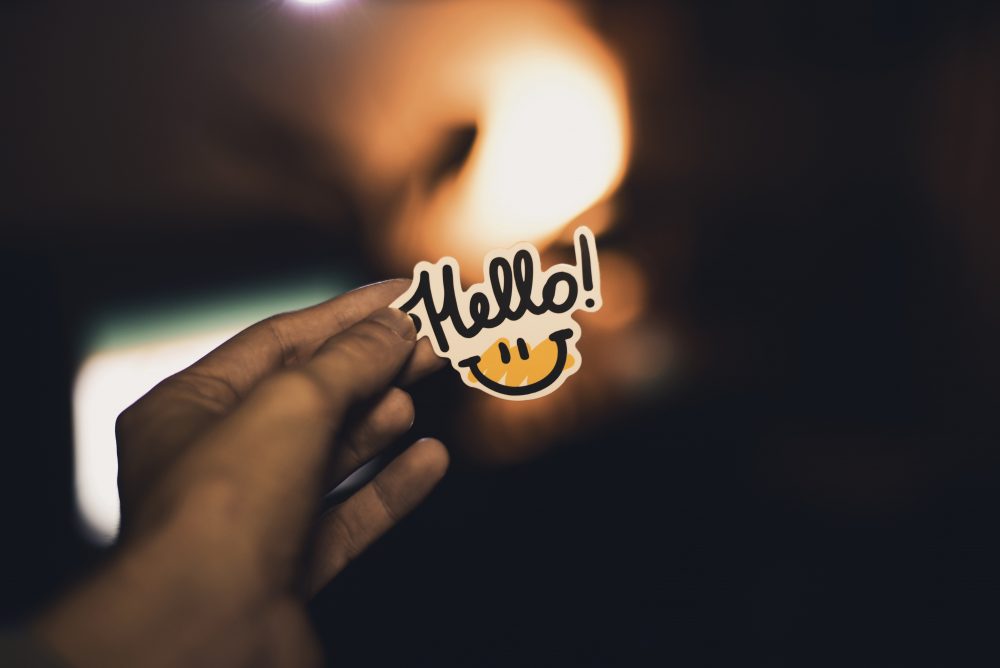You're on the Young People Site
Dedicated to self-harm recovery, insight and support.

Oliver shares with us what feeling overwhelmed is like for them.
Some days, just even opening my eyes feels hard. I lay there arguing with myself in my head: whether to try and sleep the whole day; or whether to try and talk myself into facing the day…
Then comes the endless interactions with others:
“did you sleep ok?”
“how are you doing today?”
“can you make sure you eat breakfast please?”
“got any plans for today?”
“what about your future – we need to get your college sorted?”
then I go upstairs to get dressed:
what to wear today, nothing feels ‘right’ or comfortable, nothing feels ‘me’ – how do I cover the scars? Then I feel angry – why should I cover the scars? But I don’t feel brave enough not to. I feel so angry with myself for cutting, I hate that I did it but now I feel proud of myself for stopping, but sad that I did it…
I think I will just stay in my pjs today – getting dressed feels too much, too hard, too many decisions to make.
I sit watching TV, just trying to ignore the world and it’s many demands of me: from what I think of anything and everything (I am supposed to have an opinion on politics, my education, best films, worst band, foods I like…the list is endless). I like TV, I can get lost in not having to think or even follow what’s happening too much; my mind can flit in and out without demands or questions.
I am falling asleep when my phone goes: a text. Great – another distraction and prompt to enter someone else’s world.
This time it’s different: someone is entering my world.
My Mum.
“ Hi love, just want to say – I love you. I know you are finding things hard and I may not help in the best way, but I want to help. Let me know how I can.”
I sit and think. Help: I am being offered it but I don’t even know what I need.
I reply: “Mum, I don’t know what I need. I am very unhappy but I don’t know why.”
Mum: “it’s ok to be unhappy and not know why. It’s ok to be happy and not know why. All you need to know is that you are loved, feeling like this won’t last forever, and no matter what, we will be with you, however long it takes”.
I fly downstairs and run to my mum, sitting in the sofa. I climb on her lap and am engulfed in her hug. I am safe (even when I don’t feel safe), I am loved (even when I don’t feel loved), I will get better (even when I can’t remember the last good day I had), my mum might annoy me and ask loads of questions but she actually wants to help.
When it all feels too much: I know this, I am not on my own.
I have found someone who wants to know me even when it feels too much.
It might not be your mum who texts you, it might be that you have to text someone a sad face to let them know you aren’t doing well.
I used to expect people to know that something wasn’t going well without me having to tell them, but now I realise, it’s up to me to ask for help: I can’t expect people to guess.
I am glad my mum text me, I know other people don’t have that. I hope you can find someone today to help you if you are feeling like this – it might be a friend, a counsellor, a youth worker or even the Samaritans – you can call them free or text them 116 123 (I have called them a few times and they were really helpful and kind and didn’t judge me at all).
SelfharmUK run Alumina which is an online support session for young people struggling with self-harm: it’s open to all, it’s confidential, very relaxed and run by professionals so is completely safe for you.

The piece below was written by Jo Fitzsimmons, a member of the SelfharmUK Team. The urge to self-harm is often all consuming and when it comes, it's hard to think of anything else! Next time you feel the urge to self-harm, try slowly reading this outloud, whilst breathing deeply.
I am twitchy, full of nervous energy
I can’t sit still, I can’t focus,
I am breathing quickly,
I am wringing my hands.
I try to calm myself
I try to take control
The thoughts are coming quickly
Spiralling into my head
My breathing gets faster
I must take control
Slow
Slow slow slow slow
Slow
I tell myself
The battle is done – I make the choice
Run on the spot
Clench my fists
Breathe Breathe Breathe
Run on the spot
Clench my fists
Breathe Breathe Breathe
I feel the urge
Slow Slow Slow
I match my breathing to the dogs
I bite my hands and wait
And wait
And wait
The tears begin to flow
The urge has passed
I made the choice

A broken heart hurts. It doesn’t matter how long you knew someone for or how often you saw them. If you have feelings for them and they don’t feel the same, they broke your heart and nothing will ever change that.
This may be your first heart break or you may have had your heart broken too many times to count. However many times it’s happened, it still hurts EXACTLY the same.
That pain in your chest that you’re carrying around makes you wonder if you’ll ever feel truly happy again. Sure, you can still smile. Like when your friends make you laugh, or you see something funny on Facebook. But you don’t feel it on the inside. All you feel is pain and emptiness, because the only person who can really make you happy right now - is gone. And they are never coming back.
OK, so they didn’t die. But they may as well have. They aren’t a part of your life anymore and all the things you loved about them are gone too.
I’m not talking about love here. Well I am, but you don’t have to be in love with someone to feel sad when they decide not to be a part of your life anymore. A friend of mine once said “I’ve been in enough relationships now to know that I haven’t really been in love with the people I’ve dated.”
She liked them A LOT. But the older she got, and the more couples she met, the more she came to realise that to love someone (and to be loved in return) is much more than just texting every day and spending time together at weekends.
Whilst you may not have truly loved them, you’ve still lost someone important to you through no choice of your own. And even though you might have known deep down that they wouldn’t be in your life for ever - you still secretly hoped they would.
If you type ‘heart break advice’ into Google right now, you’ll get a lot of tips (particularly around listening to Taylor Swift songs) about how to ease the pain of a broken heart. After you’ve read this blog, I suggest you do this (listening to Taylor Swift songs are optional however!).
I didn’t write this blog to give you advice about how to fix your broken heart. I wrote it because heart break can sometimes feel like the loneliest pain in the world, and I wanted you to know that you’re not alone. It can often be the type of pain that gets joked about or only associated with books or films. Sure, heart break will forever be a GREAT excuse to sit around watching Netflix for a whole weekend, not bothering to wash and eating as much ice cream and chocolate you can get your hands on! But what if the pain you’re feeling goes deeper than that?
Have you ever tried explaining to someone else that your heart feels like it’s been smashed to bits? Not easy is it. And that’s how heart break can so easily be dismissed. Because you can’t explain how you feel. Plus, even if you could, you feel pretty embarrassed and foolish that you trusted someone with your heart in the first place.
However you feel, know that your feelings are valid. Know that the pain you feel right now, is OK to feel. Sit with it. And cry with it. Don’t try to understand it or fix it. Just know that when it goes, you’ll be a stronger person because of it.

Loosing someone you love is one of the hardest things in the world to come to terms with. In the blog below, Ben, a trainee Youth Worker currently living in Oundle, talks about his experiences of loss.
Over the last two to three years I have been unfortunate enough to go through the pain of grief and loos. Some of natural causes, some of unforeseen situations. The first of which was a guy I used to serve when I worked in my local shop. He was elderly and addicted to alcohol, so wasn’t living the healthiest of lifestyles. I came into work, expecting to see him, to buy his bottle and newspaper, but that day he never came. I found out later that he had died of a heart attack. I remember the shock, the last I saw him he was fine, I couldn’t get my head around not seeing him anymore, the grief came and passed quickly and I moved on with my life.
The next two were far more difficult to deal with. The first was a family friend. A family man who was the father of three young children and the husband to a wonderful woman. I remember exactly where I was when I heard the news I was having a family dinner with my girlfriend to celebrate the end of the school year, then the phone rang. He’d died, gone, never to be seen again. The loss was sudden and no-one could believe it and although everything was done to keep him alive, it wasn’t to be. I remember to this day being told and my heart sinking. The thoughts running through my head; “what do I say to the family? How do I support the family?” and then it hit me, the grief of thinking these things through, imagining life and what it must be like, but also knowing the family myself. I sometimes feel like I didn’t have the right to grieve, after all, he wasn’t my direct family. Then I realised, I still knew him, I had been around the family for a long time and it was obviously going to be tough on me too, but it was more the thought of everything that had been left behind. This caused me to ask a lot of questions and to get very angry at God; ‘why did he do this? Why of all people did you take him?’ I still don’t know the answer to this, but what I do know is that it has brought a close family even closer.
Just after I moved to Peterborough, I was scrolling through Facebook when I saw something that shook me to my core. A friend from my home in Essex, aged just 20, had passed away in his sleep. What on earth was going? I couldn’t believe that someone who was so healthy, so full of life and so joyful was taken in one night! It was only a few months before this I saw him daily and spoke with him. I couldn’t get my head around it. I remember thinking, this could have been me! A selfish thought maybe, but the truth. it made me realise that our lives are not everlasting and we never know what will come next, what’s around the corner. I remember coming home for the funeral though, there were so many people there, the church was full and not everyone was able to fit inside. My first thought after this was not of grief, pain, anger or hurt, although I did miss him, it was of thankfulness, thankfulness of a life lived and people re-connecting because of this sudden and sad loss.
I didn’t know why any of these things happened, or why those people were taken, I want to be able to say stay strong when these things happen but I believe that the right thing to do is to grieve. We are made to feel emotions for a reason, so don’t be afraid to get angry, don’t be afraid to scream and cry but remember, you will get through this and no matter what happens in life, live every second of it, because you never know what’s next.

The blog post below was written by Ben, a trainee Youth Worker currenlty living in Oundle. Ben reflects on his life so far, the choices he made and how those choices brought him to where he is now.
School and social life can be tough for everyone at some point, but more so when you suffer from various behavioural problems such as anger management, ADHD (Attention Deficit Hyperactive Disorder) and ADD (Attention Deficit disorder).
When I started school, I was just an ordinary young teen who blended into the background and wasn’t even noticed. As I started to grow up, around the age of 13-14, difficulties began to show in my attitude in the classroom. I was starting to show tendencies of an angry, disruptive and argumentative young person. This started to show more during my move into year 10. During that summer I made loads of severe mistakes and managed to get myself into trouble with the police. It wasn’t long after that, when I began to act horribly towards my parents and other people around me. This led through to my massive downfall at school where I had my first suspension for fighting. This had a huge ripple effect on me and my family, as the repercussions from my actions where massive. Towards the end of my time in year 10 it was clear that I had just given up and I couldn’t care what I did and what happened to me. Throughout this time there were moments when I was ready to give up on everything as I didn’t feel or believe I was worth the hassle.
Going into my final year of school I was at my worst, I began to lash out at everyone who even looked at me, and would say and do some horrid things to the teachers around me, including those who were working hard to help me. Midway through year 11 I got into a significant amount of trouble with the police for a fight that I was involved in, this was the breaking point, I had to shape up, or leave home. I narrowly avoided being permanently expelled from school. This lead to me failing my GSCE’s.
I began to go to church pretty much straight after school was finished through a friend who had supported me through my time at school. In my friends’ mind, he felt as if church was the best thing for me, knowing the people who were there and what the church did for him. It was at that church I met several people who were willing to help and support me with my different problems. Ultimately I was very lucky to have met the main youth worker of the church who was willing to give up his time to sit and listen to how I felt for once and was able to relate to me as well as leading me onto a path of respect and change. He even helped to get the relationship between my parents and I stable. I was still not very nice to any of the people who were helping me, but they never gave up on me and made sure I felt listened to and valued!
Within the space of 6 months to a year, I managed to make a full transformation in my life, thanks to the amazing people who gave up and made the time for me. I was finally diagnosed with ADHD, ADD and anger management and received the support I needed. It wasn’t all easy, and I still struggled, as I do now as a 20-year-old man, but I now have the control and help I need to keep myself grounded. As years, have gone on many things have changed and I am now studying at Cambridge University, training as a youth worker, despite being told that I would never amount to anything. My passion is now working with those who are going through what I did.
I just want to say, don’t let what what’s happened in your life define you, don’t let your past mistakes stop you, and don’t let people tell you you can’t make it. You can change your life. You have the power in you to be the best you can, so know that support is there and people understand. This is your life, you can all succeed.

Frustration can be, well, frustrating in itself.
The smallest things can make us frustrated - I get easily frustrated when I’m trying to untangle my headphones or if my phone isn’t working properly! Frustration can come from the bigger things too, such as not getting the exam grades or job you want.
How do we manage these frustrations life throws at us? We can either:
- do nothing and let it frustrate us
- accept it and try and move on/let it go
- do something about it by making a change or using it for good
Sometimes there will be frustrating situations that we can’t change, and learning to let go of this frustration can be quite difficult. At the end of last year, we had to move house. Moving out of a house I’d lived in for the past 13 years, to a new house which was about an hour’s drive away, away from my hometown, friends, and half of my family, was really frustrating. It was something I couldn’t change, but had to accept – easier said than done – but possible. Telling myself that everything would be okay and that something great could come from the move really helped me accept it and let go of some of that frustration.
Sometimes there will be situations we can change, and sometimes we can use our frustration for good. I came across this quote:
‘Frustration, although quite painful at times, is a very positive and essential part of success.’ – Bo Bennett
Frustration can spur us on to greater things. Frustration can make us more determined to succeed – the frustration of not doing as well on an exam as we’d hoped, can give us the determination to work harder and achieve the grades we want. We have the choice of whether or not we decide to use the frustration for good and make a change.
I find that not only does music, taking deep breaths or having a cry help relieve frustration, but also telling myself certain things. Putting your frustration into perspective can make such a difference to how you feel. For example, if I get frustrated by how tangled my headphones are, I can remind myself that on the scale of things, this really isn’t a big deal. I just need to slow down and be patient. This can really lessen how frustrated I’m feeling and in some cases, almost make me laugh at how I’ve let something so small annoy me so much!
Recently I’ve discovered a really great way of minimizing the time I give to thinking about the bigger frustrations in life - focusing on what I’m thankful for. Starting to remind myself of all the things I’m thankful for doesn’t leave as much room to be frustrated by the other things!
Remind yourself that you can make a change.
Life is what we make of it – we can’t fully control what happens in our life, but we can choose how we react to it.

Emotionally exploding can be dangerous, often we end up hurting those closest to us and we don’t necessarily feel any better for it afterwards. That being said, sometimes I wish I had just exploded. Instead I was imploding. I thought the latter would be safer, only hurting myself but really it’s just as dangerous as the first option. I thought that I could handle everything I was feeling but the truth is I didn’t even know what I was feeling. I couldn’t separate out my emotions. Was I angry, hurt, depressed, frustrated, sad…? If I couldn’t even pin point what I was feeling, how could I explain it to anyone else? How could someone else understand what I couldn’t understand? So I bottled it up inside, trying to deal with it myself. Anxiety started to become the overriding emotion and once a week I would implode. Panic would take over my body; I couldn’t get out of bed. Simple tasks would fill me with fear and make my heart race.
I tried talking to a friend about it a couple of times – they wanted to help and suggest things that I could do to help myself but I couldn’t hear it. The fact that they could talk about my feelings so rationally and offer solutions so easily just made me feel pathetic. I felt that I was the problem – I couldn’t cope with simple situations that other people could easily manage if they were in my position.
It seemed so hopeless until one day I had arranged to see the careers advisor at my work. Before I knew it I was blurting out an incoherent, blubbering, rambling mess of how I was feeling. She was a stranger, sat there listening in silence until I had finished. When I’d finished, she didn’t try to offer an answer, she simply acknowledged that what I was feeling was valid. I wasn’t crazy, just confused and being too hard on myself. She offered me sessions with a counsellor where I could have the space and time to try and get to the source of what I was feeling, identify what was triggering my anxiety, and work on some practical tools I could use to stay calmer during an episode of anxiety. I’m still a work in progress but, a year after my turning point I feel the burden has lifted significantly. I’m trying to keep my family and friends clued in on what I’m working through so they can help spot when I am feeling overwhelmed. When I feel the tendency to bottle it all up and implode I turn to someone I really trust and simply say “I’m feeling anxious today but I’m not really sure why”. They don’t always understand but they are trying to. I think it helps them to know I am not being distant and moody; I’m just trying to stay above water.
Try talking to someone. If you feel you can talk to a friend or family member then give it a go. If it doesn’t make you feel instantly better that’s ok. There are other options out there. If you would rather talk to a stranger, there are great free services through school, or through a recommendation by your GP. If you don’t know what to talk about or can’t put into words how you are feeling then even saying that is a start. Stop beating yourself up for not being able to cope. It’s ok to admit that you feel overwhelmed. It will take time but you can feel better. You deserve to be happy.
Louise is a Research Scientist working in Dublin i.e. she is a massive geek. She is passionate about informing and encouraging young adults - empowering them to realise how awesome they truly are!

Whether you’re currently in the midst of struggling with self harm, giving up, or have stopped for years, scars can be a difficult part of self harm to deal with. I’d say I’ve pretty much accepted my scars now, yet sat on a coach writing this, bare arms, I still find myself automatically trying to cover up as someone walks past my seat.
When you were younger, did you love to show your grazes and cuts to others when you were injured from maybe climbing a tree, or doing something adventurous? Feeling proud and wanting to tell everyone how you got that injury, and even once it had healed, still showing off your scars, no matter how big or small it was?
As we grow up, this can still be the case, but scars from self harm can leave us feeling ashamed, disgusted or angry at ourselves, and are certainly something we wouldn’t point out to everyone. We even go that bit further and make the effort to actively hide them - to avoid exposing our secret, avoid the stares or questions, avoid being made to feel uncomfortable.
I really like the theme this month – Survival Scars. It makes you look at scars in a different way. They make me think of coming out of a battle, like warriors with scars, reminding us that we fought and survived. I’ve found that the way we view scars makes a huge difference when coping with them.
Being able to cope with your scars doesn’t necessarily mean showing them off. Scars are there whether we hide them or not. I think coping with scars, for me, is about acceptance. The more we accept our scars, the easier we will find it to cope with them.
A few important things to remember:
> Scars may not be as obvious as we think they are to other people. Because we know they’re there it means we’re naturally going to be more aware of them.
> One day your scars could give you the opportunity to help someone else on their journey.
> They show that through deep emotional pain, you strove to survive – so if people stare or make comments about them, don’t be ashamed, they don’t know your story and how far you’ve come.
> If you have worries about later on in life, about how you’ll deal with your scars in marriage/if you have children etc. Don’t worry about that right now, you don’t know how far you will have come by then, and it may not be a worry at all when you reach that point
Accepting your scars is a process, it may be difficult at first, but just as wounds take time to heal, so does how you view your scars. Each person is different so what could take months for one person could take years for someone else, and that’s totally okay.
Your scars are a sign of survival and healing, and you shouldn’t be ashamed of that. You made it out of battle, and that is awesome.

Sometimes when that urge to self harm arises, it can be extremely difficult to fight, and that’s completely normal. Everyone is different, everyone self harms for different reasons, and in the same way, everyone will have different alternatives and distractions that may work for them. One thing may work for one person, and may not necessarily work for another. There will be times where something that has worked before, may not work for you in that moment.
Many of you have offered a number of strategies that work for you, so we thought it would be helpful to put these into one place...
- Scribble or draw something, perhaps how you are feeling
- Splatter paint onto paper
- Write down your feelings – sometimes it helps to get out how you’re feeling, and see it on paper. You can even rip this up after you are done.
- Knitting
- Write a letter to someone or yourself and don’t send it. This could even be a positive letter to your younger self
- Create a scrap book
- Write three positive statements about yourself
- Make a positive jar, where you write down positive things about yourself, words of encouragement or any positive memories you have, and then when you are having a low day or the urge to self harm, you can take them out of the jar and read through them
- Punch a pillow/something soft
- Scream outloud or into a cushion
- Rip pages out of an old book or rip up paper
- Exercise
- Go for a walk
- Snapping twigs
- Hitting a rolled up piece of newspaper against a door frame
- Play with playdough/plasticine or roll it around in your hands
- Listen to music
- Sing at the top of your voice
- Dance around to a song
- Watch a film you love or spend some time on youtube watching some of your favourite video clips
- Read a book
- Talk to someone
- Make yourself busy and tidy your room
- Rubix cube
- Baking
- Play a game on your phone/console or computer
- Eat your favourite food
- Blowing bubbles
- Online shopping – you don’t need to buy anything, but could just have a browse
- Repetitive/therapuetic tasks such as washing up, something where you keep your hands busy
- Wrap the part you harm and sleep it off
- Drawing on yourself where you want to harm could work for you, drawing in red will also give the impression of blood
- Holding, squeezing or rubbing ice where you want to harm can give the same kind of sensation
- Have a nice and relaxing bubble bath
- Having a rubber band around your wrist can always be an alternative, pinging it against yourself when having the urge to self harm
You could also... Make a Distraction Box!
In a distraction box, you can put any of these things mentioned above in it, and all sorts of things that make you smile. This could be photos of places you’ve been or people you love. A blanket, your favourite chocolate bar, favourite film or book, lots of creative bits and bobs…. It’s totally up to you! You could add in phone numbers of people you could call, or helplines.
If you have any more distractions or alternatives that work for you, please share them in the comments below!

Have you ever noticed your inner critic?
Inner critic: What kind of stupid question is that?!
My inner critic tends to speak up a lot. In fact, for many years I never noticed this critical voice in my head, even as it told me how useless I am, how much I'm failing, how everyone secretly doesn't like me...
I was so used to the constant stream of negative thoughts that I thought it was unavoidable.
Even when everything seemed to be going well, my inner critic would pipe up with words of doom, warning me that something terrible was going to happen. And that it was probably my fault.
It's no wonder I ended up living with terrible anxiety.
Inner critic: It's hardly MY fault you're too lame to take a little criticism. Sort yourself out!
I was scared of everything and nothing, all at the same time. I was afraid of panic attacks. I was convinced there must be something wrong with me. Sometimes it seemed like a phobia I understood – like being trapped somewhere. At other times I felt anxious about existing at all.
The anxiety got so bad I couldn't see a way out. I thought I'd broken something in myself, and that I was stuck with anxiety forever.
Luckily, that wasn't true.
There were many steps that helped me to get on top of the anxiety. One of the first was noticing the existence of my inner critic.
Inner critic: YOU'RE IGNORING ME TODAY THOUGH, AREN'T YOU? HYPOCRITE!
After paying more attention to my thoughts I began to notice how many of them were negative. Even when these thoughts were true, they weren't helpful.
I started to think of this negative stream as my 'inner critic'. Labelling these thoughts in this way helped me to tune them out when they showed up: "Oh, that's just my inner critic again."
(Of course, it's not always easy to tune out thoughts, and I failed a lot – which gave the inner critic something else to criticise! But with perseverance I got better at it.)
Relating to the Inner Critic Long-term
You might think that the best way to relate to the inner critic is to fight back, or to tell them to shut up, or to argue. But actually those ideas don't help very much.
After all, the inner critic is part of me – if I go to war with them, I'm just going to war against myself.
Instead, developing a better relationship with our inner critic seems to help.
Befriending the inner critic seems like such a terrible idea. After all, almost everything they say is unhelpful: "You suck... no-one likes you... why are you even bothering to try."
If a friend behaved like that to you, you'd probably reconsider whether or not they were a good friend.
But when I looked into why the inner critic said what they said, I realised it was usually trying to protect me. They were afraid that if I tried something difficult, I would fail, and that this would be bad for me.
My inner critic was trying to help me, but they're not smart-
Inner critic: Hey!
- and they only have one skill: criticism! So they just criticise... over-and-over again, because they don't know how to do anything else.
In real life when someone is trying to help but doesn't really know how, we usually are grateful - but we would also ignore their advice.
Applying this to my relationship with my inner critic helped a lot. Instead of getting frustrated whenever they spoke up, I thanked them for it and moved on. This way I didn't get angry with myself, or listen too much to their negativity.
Saying "thanks inner critic. I get that you're trying to help, but I don't need that help right now," is much more loving approach than getting into an internal war.
(Of course this is difficult too... love often requires more effort than fighting.)
Anxiety is complicated, and sadly there usually isn't just one magic wand we can wave to fix it.
But perhaps being grateful to your inner critic, and remembering that they're just a part of you that wants you to succeed, can help you to both be more loving to yourself and to ignore the negative thoughts of your inner critic.
Neil Hughes is the writer of 'Walking on Custard & the Meaning of Life', a comedy book about anxiety.
You can find out more at http://whats.walkingoncustard.com or you can follow him (and his inner critic) on Twitter at www.twitter.com/enhughesiasm
